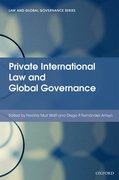- Provides a critical approach to private international law in
the context of global governance
- Explores the potential of private international law to reassert
a significant governance function in respect of new forms of authority
beyond the state
- Contributes to ongoing debates about the changing nature of law
in a global era
Contemporary debates about the changing nature of law engage
theories of legal pluralism, political economy, social systems,
international relations (or regime theory), global constitutionalism, and
public international law. Such debates reveal a variety of emerging
responses to distributional issues which arise beyond the Western welfare
state and new conceptions of private transnational authority. However,
private international law tends to stand aloof, claiming process-based
neutrality or the apolitical nature of private law technique and refusing
to recognize frontiers beyond than those of the nation-state. As a result,
the discipline is paradoxically ill-equipped to deal with the most
significant cross-border legal difficulties - from immigration to private
financial regulation - which might have been expected to fall within its
remit. Contributing little to the governance of transnational non-state
power, it is largely complicit in its unhampered expansion. This is all the
more a paradox given that the new thinking from other fields which seek to
fill the void - theories of legal pluralism, peer networks, transnational
substantive rules, privatized dispute resolution, and regime collision -
have long been part of the daily fare of the conflict of laws. The crucial
issue now is whether private international law can, or indeed should,
survive as a discipline.
This volume lays the foundations for a critical approach to private
international law in the global era. While the governance of global issues
such as health, climate, and finance clearly implicates the law, and
particularly international law, its private law dimension is generally
invisible. This book develops the idea that the liberal divide between
public and private international law has enabled the unregulated expansion
of transnational private power in these various fields. It explores the
potential of private international law to reassert a significant governance
function in respect of new forms of authority beyond the state. To do so,
it must shed a number of assumptions entrenched in the culture of the
nation-state, but this will permit the discipline to expand its potential
to confront major issues in global governance.
Readership: Scholars and
students of regulation, international law, international relations, and
global governance; policy makers within national and international
regulatory bodies.
|
 Book
Book




Nenhum comentário:
Postar um comentário